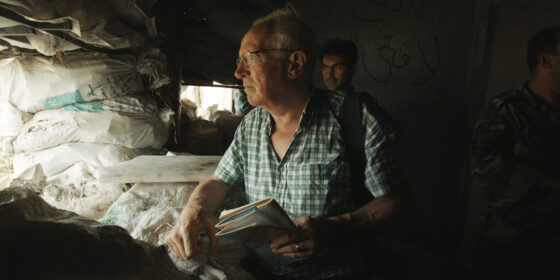This is Not a Movie (Yung Chang, Canada/Germany) — TIFF Docs

By Steve Macfarlane
“The person who denies the genocide in Armenia will deny the Jewish holocaust in Europe, and will deny any other kind of massacre that comes to hand.” That’s Robert Fisk, among the most celebrated war correspondents of the last quarter-century, getting the bio-doc treatment in Yung Chang’s documentary This is Not a Movie. Chang’s title comes from Fisk’s remarks on his own career juxtaposed against Hitchcock’s Foreign Correspondent, the film that sparked his obsession with journalism as a child growing up in postwar Britain. Fisk is a fiery dialectician with the demeanour of a benign grandpa, arguing on behalf of nuance in both syntax and reportage, and against the “de-semanticization of war”—the most egregious example being the post-9/11 tendency of journalists to reduce everything to “terror” and “evil,” “clashed” instead of “killed,” “settlements” instead of “colonies,” and so on. Given recent hand-wringing at The New York Times over the editors’ obsession with using bywords to avoid stating the plainly obvious—whether it’s a refugee crisis, yet another young black man murdered by racist cops or, indeed, the 44th President’s full-tilt-boogie embrace of white supremacists—Chang’s film arrives at a fortuitous time.
Fisk hedges against the sweeping shibboleths that follow any given historical catastrophe, drawing on his own experiences covering combat zones, from Northern Ireland at the start of his career to Syria today. Even if This is Not a Movie appears to be yet another magazine profile-style hagiography in doc form, it also uses Fisk as a litmus test for the last quarter-century’s crisis of journalistic integrity. In a career that has seen him tarred as a moral relativist, an anti-Semite, an Al Qaeda appeaser, and much else, Fisk remains firmly on the side of the powerless, and much of what he has to say is provocative at a minimum. He believes in neutrality, but also argues that objectivity is essentially an impossible pretense (“I’m a nerve ending, not a machine!”). He avers that the Armistice Day poppy was in fact a sentimental ploy to drum up pro-war sentiment in the United Kingdom after World War I, and bemoans the ideological pivoting of The Times (his longtime paper of employ) after it came under Rupert Murdoch’s ownership; Fisk’s final straw was the editorial decision to spike his reportage into Iran Air Flight 665, wherein the US Navy shot down a commercial Iranian airliner and killed nearly 300 civilians.
As cinema, This is Not a Movie ranges from fascinating (especially the archival footage from Fisk’s travels in Ireland and Beirut as a younger man) to formally wearisome (e.g., the Explosions in the Sky-grade arena-rock treacle on the soundtrack). After hopscotching across Fisk’s many lives over the past four decades, the narrative settles on Idlib, Syria, where Fisk is a rare dissenter against reports (initially circulated by the White Helmets) that the Assad regime used chemical weapons against civilians and refugees in Douma, which allowed NATO-allied countries to bomb the hell out of an already demolished war zone. Which version of events is to be believed? (For accepting the help of the Syrian government in gaining access to these zones, and for his skeptical reporting on the Douma case, Fisk has been accused of being an Assadist as well—criticisms that appear in Chang’s film.) By the lights of Chang’s film, Fisk is out there advocating on behalf of a mercilessly detailed appreciation of catastrophe minutiae than can’t possibly fit in 280 characters; the result is a portrait of an idiosyncratic (but by no means unimpeachable) 20th-century mind racing against the dystopian swirl of fabricated information being weaponized, now, from continent to continent.
Steve Macfarlane

